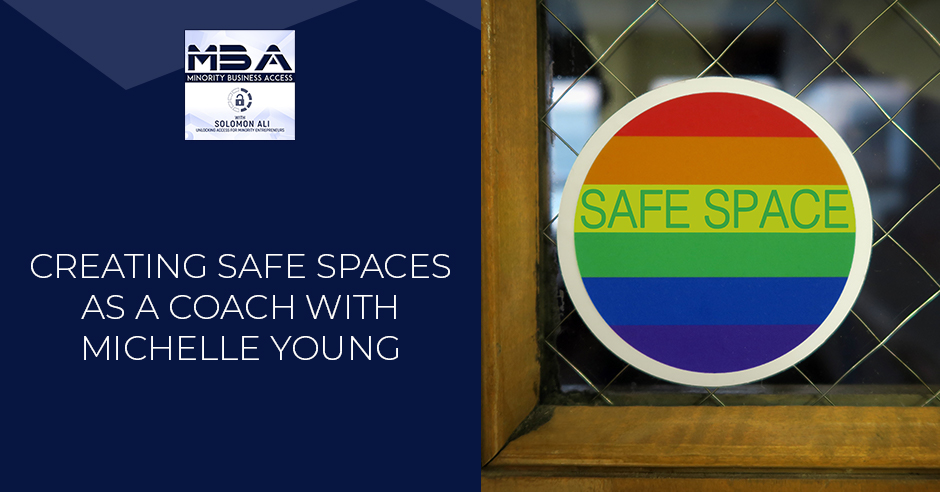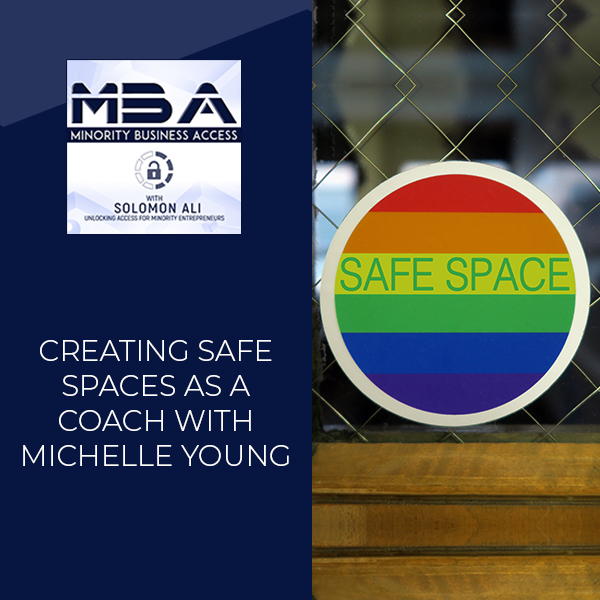
Most of us are taught to suppress emotions when they come up and give into limiting beliefs instead. It’s high time we get rid of that notion and create a safe space for ourselves to express how we feel and allow ourselves to grow. This is what Executive Coach Michelle Pearson Young teaches to her clients. In this episode, Michelle talks about the importance of being a coach and why it is necessary to have one. She discusses the things a person needs to receive or should know from a coach. Michelle encourages everyone, especially entrepreneurs to be coached in some way. She is open to accepting anyone interested in her coaching services.
—
Watch the episode here
Listen to the podcast here
Creating Safe Spaces As A Coach with Michelle Young
Michelle, I’m excited to have you on MBA. I am totally thrilled. Because I won’t do great justice in introducing you, I want you to introduce yourself to my audience at MBA.
I’m happy to do it. My name is Michelle Pierson Young and I am an executive coach. I am seriously delighted to be here with you. I’m a huge Solomon fan. I’m actually nervous. I hold you in high regard.
I was having a problem in business trying to break through a certain level. It dawned on me that just like in sports, you need a coach. In business, you need a coach or a mentor. Michelle came highly recommended. I use Michelle and I start breaking through different barriers. What I would like for Michelle to tell everyone is the importance of being a coach, helping entrepreneurs go through the difficulties that may be things from their childhood, false things that they think they know but they don’t know, so that they can break through some things.
Thank you. I’m an executive coach. If I’m being completely honest, which I’d rather not, I’d rather be like, “I’m so fancy. I was born super smart. I know all the things.” The truth is what I discovered was as my life got closer to the way I wanted it to look, I had the relationship, the kids, the expression and the abundance in my life that I wanted. When I got to that point, what happened for me at least was I thought, “I still don’t feel that good. I got everything that I wanted but I still don’t feel happy inside. There’s got to be something more.” That’s how I started on the journey of not only doing it for myself. Honestly, my primary is like, “What do I need to do here?” In addition to that, it was, “How can I teach other people?” I know smart and successful people. If I’m not feeling that fulfillment inside or I’m feeling unsure even though people tell me I look confident, then other people are going to feel that too.
I became a coach because people need to say things out loud. People need to be able to say what they’re thinking. Especially for entrepreneurs, there’s not often a safe place to do that. You’ve got your teams, your relationships and you’re standing there being strong for them. Where do you go to say, “I don’t feel strong?” That’s what a coach does. A coach listens. They do a lot of listening. If you’re looking for a coach, make sure that you’re doing a lot of talking and the coach is doing a lot of listening. It’s about the other person and also reflect back what I hear my clients say. I reflect back to them, “I think I just heard you say this, is that right?” A lot of times, they go, “Oh.” Other times, I get to ask questions that they haven’t necessarily asked themselves. Those questions clarify the thinking. All of a sudden, they go, “I understand now.”
I know the help that you’ve given me and how much it has impacted my life. It helped to increase my net worth. Most of my people are going to be minority people, entrepreneurs from different walks of life. Being a coach and working with different people from different walks of life, what would you say is the number one thing that they need to receive or should know from a coach?
Almost, without exception, your limiting thoughts are based on opinions that you think are facts.
The number one thing is that I would invite them and you and me into questioning what you think your limits are. Imagining that, “It can’t quite be you because,” and then fill in the blank, it’s the color of your skin. “It can’t be me because,” and then you imagine that you don’t have that certificate on the wall. Limiting beliefs is what I and many other coaches call them. We all think those limiting beliefs have merit to them. The truth is that they don’t. They’re opinions often given by other people.
We’re told culturally that you have to look like this or act like this or have these things. They’re given to us by our parents, teachers and by ourselves. Those are the worst ones. The ones that we say, “I shouldn’t try that because.” For women, a lot of times, it’s how much we weigh. “I can’t be successful because I don’t look beautiful or perfect or the weight on the scale.” For men, a lot of times, it’s a dollar amount in a bank account or that they didn’t get that respect. The one thing that I would invite every single person reading this is to ask themselves questions, “Is that a fact, an opinion or an emotion that I’m dealing with?” Almost, without exception, your limiting thoughts are based on opinions that you think are facts.
Why is a coach necessary? I don’t know if I was skeptical or a little hesitant. I don’t know if I had a fear or I was procrastinating. When I pull the trigger, I’m pulling the trigger, I feel so much lighter and I’m watching all these new stuff happen. I’m like, “This is pretty neat.” Before, I kick that down the road a little bit before I do it, but I knew I needed to do that or at least it crossed my mind. You helped me to get out of that shell or get out of my way. That’s what I want you to tell them, why they need a coach, how you can help them to get out of the way, of themselves to achieve the things that they want to achieve.
That the world needs them to achieve. That’s the thing about it. There are things that are in our hearts that are placed there by God, by the infinite, by the universe. There are things that we want to do, be, have, experience and impacts that we want to make. The reason that coaching is important is that it is that safe space. I like to draw a picture of a brain when I’m talking to my clients. I drew this remedial picture of a brain and I showed the client. I filled the bottom part of the brain and scribbled all over it. I said, “This is,” and you can fill in the blank. This is your anger or this is your fear. These are the limiting beliefs that you’ve had in the past that we were taught to squish down. If I feel angry, I should squish them down. If I feel uncomfortable in a room with people that I’m supposed to feel safe with, I’m going to squish that down.
It might seem like it’s a tiny little amount of your brain. It’s only a fifth of your brain in my picture. Of course, it’s a metaphor. Even if it’s just a fifth of your brain, think about using a fifth of your brain to not do what you want to do, to not experience what you want to have. That’s a lot of brainpower that’s being used to push down emotions that are meant to serve us. What a coach does is you get to take that part of your experience out, what you’re using your brain bandwidth for and put it in a large room. Now, it’s minuscule based on the space. That’s what a coach does. It takes quite a lot of your brainpower and puts it in a room. You get to sort it out and all of a sudden, what you’re doing is you’re freeing up your brainpower to accomplish what you want.

Creating Safe Spaces: Coaches ask what you’d love to have instead of that thing that’s been troubling you and get some new software downloaded in your brain.
That’s what you did.
That is not what I did. That’s what you did. I invited you into it and you were all about doing the work.
I feel empowered. I know you asked me about the SEC stuff. One of the things you kept telling me is, “You have permission to be angry.” I kept going around like, “No, I don’t have the right to be angry. They’re just trying to do their jobs.” Although I felt, “This is unfair. This is unjust what they’re doing.” It’s all checking out that it’s unfair and unjust, but I didn’t have permission to be upset or angry. You got that out of me so that I could deal with it. I was like, “We’re going all the way.” That was one of the things that was freeing and exciting. It was like, “I knew I was right. I knew I didn’t do anything wrong.” You question yourself and you doubt yourself. This big government agency, all powerful, is saying that you did something wrong and this and that. It’s difficult. Other people are like, “Just settle and get it behind you.”
“Don’t let this upset you. Just take care of it.”
I was dealing with all of that amongst other things. Here comes you coaching my life. Dealing with it now is a lot easier. That helped. How would you do for other people what you did for me?
People need to say things out loud and say what they’re thinking.
The principles are always the same. Your life experiences, the SEC issues, all of those things are uniquely Solomon. They are you and they’re your experiences. That’s the thing. We all walk into an event or into a situation and we imagine that we’re the only one that’s going, “I hope somebody talks to me,” and, “Am I qualified to be here?” We think that these are unique thoughts to ourselves. What I get to do is listen to the unique individual, the Solomon, the Jonah and Micah. We believe that we’re coming in with unique fears. I hope you don’t mind me saying, I have continued to be impressed with your willingness to be open and transparent with it. When anybody can come to me and say, “This is what I’m afraid of,” or “This is what I’m going through,” or “Let me tell you the truth now,” that’s when they say it out loud and having a safe space, because if it’s scary and bad, it’s a safe place to say it.
The SEC is scary. It’s like the Boogeyman.
“Please don’t come to my door.” It is legitimately scary. Based on what you’ve told me, you are able to come and talk about it and be open about it and have me say, “I think I’m hearing some anger in your voice.” You’re going, “No, that’s not what I have.” Talking out whatever anybody’s own personal demons are, or their own personal present challenges, or they’re looking for that next level up, or they’re looking at their lives going, “It should feel good but it doesn’t feel as good as I want it to.” That’s when we get to take it out of your brain. Question what it is and ask what you’d love to have instead of that thing that’s been troubling you. Get some new software downloaded in your brain.
As a coach, I know how you’ve helped me and I know what you can do for them. Can you please share how they can get ahold of you?
Your business partner says, “Know what your superpowers are and know what you suck at.” What I suck at is technology. I could tell you to go to a website where you would be impressed. The truth is, if you try to email me from that website, it probably won’t get to me because I have kept up on it. MichelleAtPlay@Gmail.com is my email or (503) 957-0821. Text me and tell me what demons are in your head.
Michelle, I want to thank you so much for everything that you’ve done for me and helping me to get rid of all the monsters. We’ve got more monsters to get rid of. I haven’t reached my number yet so I’m excited. Anyone, if you are serious about being in business, running a business, whether you’re one year, just starting or been in it for 5 or 10 years, you need a coach. You need someone to talk to. You can’t talk to your employees. A lot of times, you can’t even talk to your spouse about it. You can’t talk to the people around you and you have to work out some things. Normally, if you work those things out with a coach, you’ll figure things out about yourself that’ll allow you to be a lot more successful. Reach out to Michelle. Hit her up, become more successful, have a better year and prosper a little bit more. Michelle, I want to thank you so much for coming on MBA.

